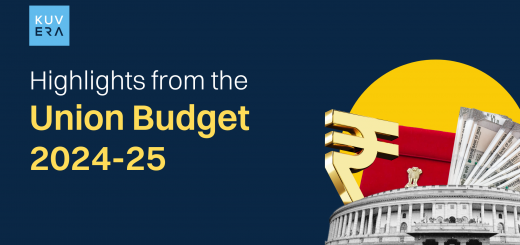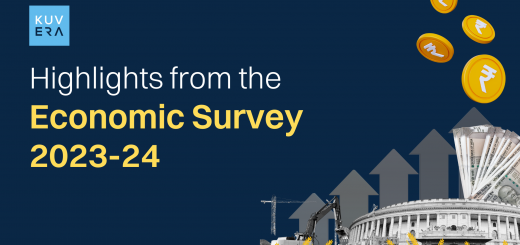Union Budget 2024 also known as the ‘Viksit Bharat Budget 2024’ will be presented by Finance Minister (FM) Nirmala Sitharaman on 23rd July 2024. This is the second time the FM will be presenting the budget this year after the interim budget in February 2024. The Interim budget increased the capital expenditure plan for the financial year 2024-25 by 11.1% to ₹11,11,111 crore.
Union Budget details how much money the government expects to earn and how it plans to spend it over the financial year, which starts from April 1st to March 31st. The Indian budget process also involves a ritual called the Halwa ceremony, which was held on 16th July 2024, and marks the final stage of budget preparation.
The Halwa ceremony is a tradition where the Finance Minister participates in the preparation of the ceremonial ‘halwa’ (a sweet dish) in the presence of senior ministry officials. This ritual symbolises the sealing of the budget documents and the beginning of the printing process.
Now let’s dive into the common terms around the union budget.
Budget 2024 Guide to Understanding Key Financial Terms
What is the meaning of Interim Budget?
The Interim Budget is presented when the present ruling government is nearing the end of its term and elections are approaching. Instead of a full budget, the government presents an interim one to get approval for a few months of spending.
What Is The Finance Bill?
The Finance Bill is a plan presented by the Finance Minister in the Parliament. It is that part of the budget which includes all the proposed changes to financial policies and, then it is presented in the Lok Sabha.
What Happens After The Finance Bill Is Passed?
Once the Finance Bill is approved by the Lok Sabha, it becomes the Finance Act. For example, the budget presented in the start of 2024, is the ‘Finance Bill 2024’, and once it is passed, it will be the ‘Finance Act 2024’.
What Do You Mean By Fiscal Deficit?
A fiscal deficit is when the government’s spending exceeds its revenue. To cover this gap, the government borrows money. A high fiscal deficit leads to higher inflation and makes borrowing more expensive for everyone.
Start investing in Index Funds.
What Is GDP?
GDP or Gross Domestic Product, is the total value of all goods and services produced within India’s borders in a year. It indicates the country’s economic health. It can be calculated in two ways: real GDP (which adjusts for inflation) and nominal GDP (which does not adjust for inflation).
What Are Revenue And Capital Budgets?
The capital budget consists of two key items- capital receipts and capital expenditure. Capital receipts are funds the government gets from borrowing or selling assets, while capital expenditure is the money spent on creating long-term assets like roads, ports and power plants.
The revenue budget covers revenue receipts and revenue expenditure. Revenue receipts include money the government earns from taxes, interest and fees, while revenue expenditure is the day-to-day spending on things like salaries, pensions and running government services.
Direct Vs. Indirect Taxes
Direct taxes are imposed directly on your income or wealth, such as income tax and corporate tax. On the other hand, indirect taxes are levied on the consumption of goods and services, like the Goods and Services Tax (GST) or customs duty.
Direct taxes are paid directly by the taxpayer, while indirect taxes can be passed on to consumers. Income tax is based on the taxpayer’s ability to pay, whereas indirect taxes like GST is based on the consumption of goods and services.
What Are Subsidies And Grants?
Subsidies are government payments or tax reductions that help reduce the costs of certain goods or services. This helps the marginalised communities with food, fertilisers and oil needs which are the top contributors to revenue expenditures. Hence, they are an important component of government budgets.
Grants are sums of money given by governments to support specific projects or initiatives, often without the requirement of repayment. The key difference is that subsidies are aimed at making products or services more affordable, while grants are intended to fund initiatives.
What Is The Role Of Public Debt In The Budget?
Public debt refers to the total amount of money owed by the government. It helps the government finance its activities without reducing the real wealth of individuals and businesses. According to the Finance Ministry, total gross liabilities increased to ₹160.69 lakh crore by December 2023.
What Is Disinvestment?
Disinvestment refers to the partial sale of government equity in public sector enterprises to private entities. It is a key component of the budget and fiscal policy.
What is Fiscal Policy?
Fiscal policy involves how the government collects and spends money to influence the economy. This includes taxes, levies and government spending. The Union Budget is a key part of fiscal policy. Last financial year the fiscal deficit was 5.63% of the budget.
What Is Monetary Policy And How Does Budget Affect It?
Monetary policy is handled by the Reserve Bank of India (RBI) and involves controlling the money supply and interest rates to keep the economy stable. The RBI decides how much money banks should keep in reserves and sets interest rates. But budgetary decisions also affect the monetary policy of a country. Especially interest rate movements by the central bank.
How Does The Budget Affect Businesses?
Budget affects businesses as it allows them to plan and control their finances, and prevent long-term debts. It also provides smaller businesses with subsidies and grants.
How Does The Union Budget Impact You?
There are a number of ways that the union budget can affect your personal finances. First, is the change in interest rates of various financial products such as fixed deposits and home loans. Second, if you have invested in savings schemes and retirement plans, any changes proposed in the budget can have an impact on your portfolio. Thirdly, the budget also affects your cost of living. Lastly, the union budget affects the stock market as it outlines the government expenditure in different sectors.
Wrapping Up
Familiarising ourselves with terms like GDP, fiscal policy, deficit, and direct and indirect taxes also helps us make informed decisions about our financial future. As the Indian economy continues to grow these budget-related terminologies will help us stay ahead of the curve.
The strategy for Amrit Kaal is in wraps and the union budget 2024 is eagerly awaited by many. By prioritising investments in booming sectors, the budget aims to propel the nation forward on its path to becoming a $5 trillion economy.
Interested in how we think about the markets?
Read more: Zen And The Art Of Investing
Watch here: Investing in Focused Mutual Funds
Start investing through a platform that brings goal planning and investing to your fingertips. Visit kuvera.in to discover Direct Plans of Mutual Funds and Fixed Deposits and start investing today.
AREVUK Advisory Services Pvt Ltd | SEBI Registration No. INA200005166
DISCLAIMER: Mutual Fund investments are subject to market risks. Read all scheme related documents carefully. Registration granted by SEBI, membership of BASL (in case of IAs) and certification from NISM in no way guarantee performance of the intermediary or provide any assurance of returns to investors. Investments in securities market are subject to market risks. Read all the related documents carefully before investing. The securities quoted are for illustration only and are not recommendatory.












